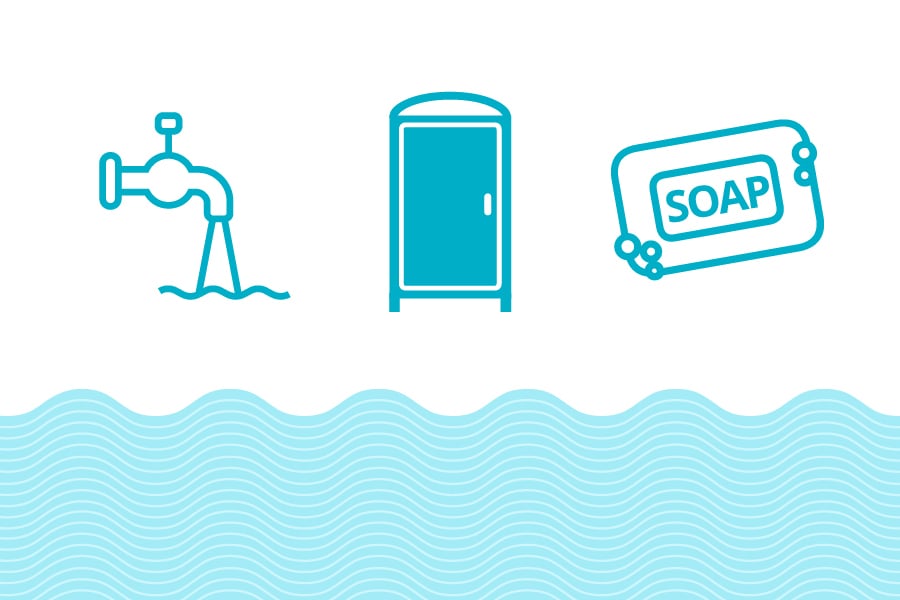Outbreak response: Water, Sanitation & Hygiene (WASH) specialist

Share this step
In Week 1, we learned about the role of water, sanitation and hygiene experts in outbreak response. In this step, Tom Heath (Action Contre La Faim), Luca Fontana (MSF) and Pierre-Yves Oger (UNICEF) outline the specific activities these experts do, and some of the challenges they face, while working to control an outbreak.
1) What are outbreak-specific WASH activities?
During a cholera outbreak response, water, sanitation and hygiene (WASH) professionals will first focus on ensuring infection prevention and control (IPC) activities in cholera treatment centres, while also implementing activities to prevent new cases in the most at-risk individuals and in the communities.
WASH and IPC activities in a cholera treatment unit include:
-
provision of clean water and adequate sanitation for patients and staff;
-
production of chlorinated solutions;
-
environmental cleaning of the facility;
-
laundry;
-
overall hygiene supervision including for food preparation;
-
waste management; and
-
dead body management.
To prevent new cases as much as possible, WASH professionals are also fully involved in field investigations and assessments of risk/protective factors, such as improved water sources availability; access to improved sanitation facilities; hygiene behaviours; and local funeral practices. This information usually leads to community-based activities such as interventions targeting patients’ households and their direct neighbours, often through dedicated Rapid Response Teams (RRT).
Household contacts of patients with cholera and their neighbours are specifically at high risk during the week after the index patient seeks hospital care, with the risk decreasing with distance to the patient’s household. This provides a window of opportunity to implement cost-effective interventions at household level. Interventions usually include provision of disinfection kits and on-spot training to ensure the adequate use of the material provided (at least a communication leaflet on cholera, some water treatment products, soap and often some cleaning detergent and oral rehydration salts). Interventions at the household level must ideally reach 100 percent of case contacts to ensure interruption of transmission. This requires a strong data management system, a clear understanding of the epidemiological situation (including georeferenced data) and a well-suited collaboration between health and WASH actors. Note that improving sanitation is typically not part of RRT activities due to the challenges rapidly mobilising construction materials and constructing latrines.
Community engagement remains a key component of outbreak response in order to prevent the spread of disease. Existing community perceptions and beliefs can support or hinder a response, so it is important to understand and address them. Some social norms may need to be modified to prevent disease transmission. For example, working with the community to find alternative forms of greeting one another to replace handshaking.
Encouraging specific disease prevention and treatment measures within the affected community is critical. The spectrum of WASH interventions is quite large, from ensuring chlorination of water networks to promoting behaviour change and the practice of handwashing. This type of activity can also be implemented outside of an outbreak response, but the key in an outbreak response is to select the type of intervention and the location based on the epidemiology of the disease and on the identification of key risk factors. The implementation is often done alongside social mobilisers to ensure adequate community engagement. The diagram below (Figure 1) provides an overview of key community-based WASH actions during an outbreak.

Figure 1: WASH principles for action in the community during outbreaks (Source Sphere 2018). This figure is also available as a PDF download at the bottom of the page.
For viral haemorrhagic fevers, such as Ebola, WASH specialists play a key role in the response. Designing and building treatment centers requires a thorough knowledge of the disease, hygiene protocols and a clear understanding of the functioning of the center itself. The staff must be trained on the use of the specific personal protective equipment (PPE) and the adequate IPC protocols for environmental cleaning. Beside the Ebola treatment center, WASH specialists should be involved in outreach and community activities in order to reduce the spreading of disease. These activities include household and health facilities decontamination; safe and dignified burials; contact vaccination, etc. Haemorrhagic fever response requires not only a thorough knowledge of the disease and its protocols but the ability to work in multidisciplinary teams, especially for community activities where anthropologists and health promoters should drive and lead all of the activities.
2) What are some of the main challenges for WASH professionals in outbreak response?
Coordination between the WASH and Health sectors is often a significant challenge during outbreaks and sharing of information is not always prioritised. For example, epidemiological data may be shared only at the national or district level, and this data may only be shared with the WASH sector at the weekly or bi-weekly task force meeting.
In addition to coordination, WASH professionals face a range of other challenges in the field. Some not specific to outbreaks but due to the fact that epidemic outbreaks often affect areas already suffering from poor governance and instability, resulting in limited access due to poor roads or insecurity (e.g. the recent cholera outbreaks in Yemen or North Nigeria or the Ebola outbreak in eastern Democratic Republic of the Congo).
Other constraints are more specific to outbreak contexts, such as the fear of contracting the virus or the stigmatization of cured patients, for example from cholera in Haiti or from Ebola in Western Africa. Several infectious diseases such as cholera, Ebola and other haemorrhagic fevers, require the implementation of a safe and dignified burial procedure in order to reduce disease transmission. Adapting this and other protocols to the local cultures and funeral rituals (which can vary widely even within few kilometres) without compromising biosafety is a constant challenge for WASH actors. For this reason, among others, the support of anthropologists is now recognized as a critical added value for health, WASH and community workers involved in outbreak responses.
Share this
Disease Outbreaks in Low and Middle Income Countries

Disease Outbreaks in Low and Middle Income Countries


Reach your personal and professional goals
Unlock access to hundreds of expert online courses and degrees from top universities and educators to gain accredited qualifications and professional CV-building certificates.
Join over 18 million learners to launch, switch or build upon your career, all at your own pace, across a wide range of topic areas.
Register to receive updates
-
Create an account to receive our newsletter, course recommendations and promotions.
Register for free







